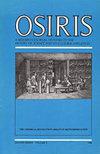机器中的马克思主义者
IF 1
3区 哲学
Q2 HISTORY & PHILOSOPHY OF SCIENCE
引用次数: 2
摘要
本文探讨了美籍华裔逻辑学家王浩的生平和工作。王在一系列交叉点上工作:东方马克思主义和西方分析哲学;在数学和计算机之间;在中心和外围之间。虽然他自己是一名分析哲学家,但他对这个领域感到不满,认为它充斥着“虚构”和“抽象”,既没有充分描述也没有实际服务于人类生活的现实。在20世纪50年代,他反对想象中的人类推理的普遍性和规则性,这是逻辑学和早期人工智能研究的核心“虚构”。王从马克思主义和唯物主义中得出结论,每个人的理性实际上是不同的,根据“他们的身心历史”。他转向现代数字计算机,希望它们能够为哲学思想创造新的实际用途,因为他相信它们与人类思维的区别在认识论上是强大的。本文章由计算机程序翻译,如有差异,请以英文原文为准。
The Marxist in the Machine
This article explores the life and work of Chinese American logician Hao Wang. Wang worked at a set of intersections: between Eastern Marxism and Western analytic philosophy; between mathematics and computing; between center and periphery. Though an analytic philosopher himself, Wang became dissatisfied with the field, proposing that it traffics in “fictions” and “abstractions” that neither adequately described nor practically served the realities of human life. In the 1950s, he argued against the imagined universality and rule-boundedness of human reasoning, a central “fiction” of both logic and early artificial intelligence research. Wang drew from Marxism and materialism to argue instead that each person in fact reasons differently, according to the “history of [their] mind and body.” He turned to modern digital computers in hopes that they might create new practical uses for philosophical ideas, and because he believed their difference from human minds was epistemically powerful.
求助全文
通过发布文献求助,成功后即可免费获取论文全文。
去求助
来源期刊

Osiris
管理科学-科学史与科学哲学
CiteScore
1.10
自引率
0.00%
发文量
18
审稿时长
>12 weeks
期刊介绍:
Founded in 1936 by George Sarton, and relaunched by the History of Science Society in 1985, Osiris is an annual thematic journal that highlights research on significant themes in the history of science. Recent volumes have included Scientific Masculinities, History of Science and the Emotions, and Data Histories.
 求助内容:
求助内容: 应助结果提醒方式:
应助结果提醒方式:


